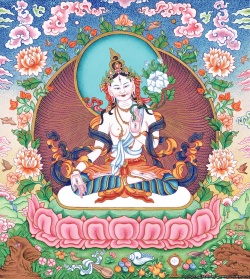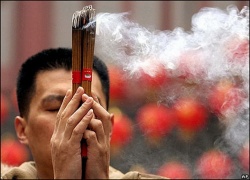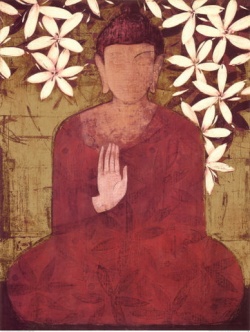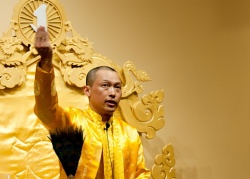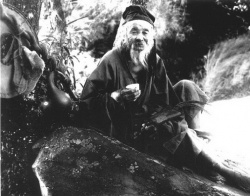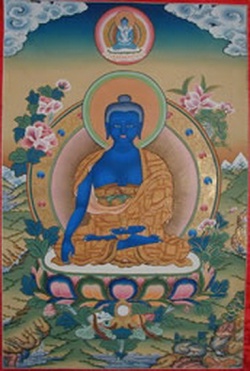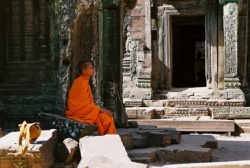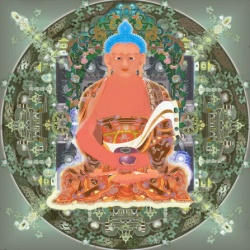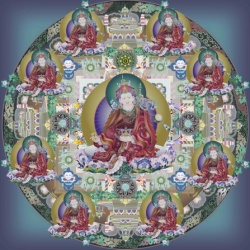The Gospel of Buddha:Chapter 84: The Mustard Seed
There was a rich man who found his gold suddenly transformed into ashes;
and he took to his bed and refused all food.
A friend, hearing of his sickness,
visited the rich man and learned the cause of his grief.
And the friend said:
"Thou didst not make good use of thy wealth.
When thou didst hoard it up it was not better than ashes.
Now heed my advice. Spread mats in the bazaar;
pile up these ashes, and pretend to trade with them." [1]
The rich man did as his friend had told him,
and when his neighbours asked him,
"Why sellest thou ashes?" he said:
"I offer my goods for sale." [2]
After some time a young girl, named Kisa Gotama,
an orphan and very poor, passed by,
and seeing the rich man in the bazaar, said:
"My lord, why pilest thou thus up gold and silver for sale." [3]
And the rich man said:
"Wilt thou please hand me that gold and silver?"
And Kisa Gotami took up a handful of ashes,
and lo! they changed back into gold. [4]
Considering that Kisa Gotami had the mental eye of spiritual knowledge
and saw the real worth of things,
the rich man gave her in marriage to his son, and he said:
"With many, gold is no better than ashes,
but with Kisa Gotami ashes become pure gold." [5]
And Kisa Gotami had an only son, and he died.
In her grief she carried the dead child to all her neighbours,
asking them for medicine, and the people said:
"She has lost her senses. The boy is dead." [6]
At length Kisa Gotami met a man who replied to her request:
"I cannot give thee medicine for thy child,
but I know a physician who can." [7]
And the girl said: "Pray tell me, sir; who is it?"
And the man replied: "Go to Sakyamuni, the Buddha." [8]
Kisa Gotami repaired to the Buddha and cried:
"Lord and Master, give me medicine that will cure my boy." [8]
The Buddha answered:
"I want a handful of mustard seed."
And when the girl in her joy promised to procure it, the Buddha added:
"The mustard seed must be taken from a house
where no one has lost a child, husband, parent, or friend." [10]
Poor Kisa Gotami now went from house to house,
and the people pitied her and said:
"Here is mustard seed; take it!"
But when she asked,
"Did a son or daughter, a father or mother, die in your family?"
They answered her:
"Alas! the living are few, but the dead are many.
Do not remind us of our deepest grief."
And there was no house but some beloved one had died in it. [11]
Kisa Gotami became weary and hopeless, and sat down at the wayside,
watching the lights of the city, as they flickered up and were extinguished again.
At last the darkness of the night reigned everywhere.
And she considered the fate of men,
that their lives flicker up and are extinguished.
And she thought to herself:
"How selfish am I in my grief!
Death is common to all;
yet in this valley of desolation there is a path
that leads him to immortality who has surrendered all selfishness." [12]
Putting away the selfishness of her affection for her child,
Kisa Gotami had the dead boy buried in the forest.
Returning to the Buddha, she took refuge in him
and found comfort in the Dharma,
which is a balm that will soothe
all the pains of our troubled hearts. [13]
The Buddha said: [14]
"The life of mortals in this world
is troubled and brief and combined with pain.
For there is not any means by which those
that have been born can avoid dying;
after reaching old age there is death; of such a nature are living beings. [15]
"As ripe fruits are early in danger of falling,
so mortals when born are always in danger of death. [16]
"As all earthen vessels made by the potter and in being broken,
so is the life of mortals. [17]
"Both young and adult,
both those who are fools
and those who are wise,
all fall into the power of death;
all are subject to death. [18]
"Of those who, overcome by death, depart from life,
a father cannot save his son, nor kinsmen their relations. [19]
"Mark! while relatives are looking on and lamenting deeply,
one by one mortals are carried off,
like an ox that is led to the slaughter. [20]
"So the world is afflicted with death and decay,
therefore the wise do not grieve,
knowing the terms of the world. [21]
"In whatever manner people think a thing will come to pass,
it is often different when it happens,
and great is the disappointment;
see, such are the terms of the world. [22]
"Not from weeping nor from grieving will any one obtain peace of mind;
on the contrary, his pain will be the greater and his body will suffer.
He will make himself sick and pale,
yet the dead are not saved by his lamentation. [23]
"People pass away,
and their fate after death
will be according to their deeds. [24]
"If a man live a hundred years, or even more,
he will at last be separated from the company of his relatives,
and leave the life of this world. [25]
"He who seeks peace
should draw out the arrow of lamentation, and complaint, and grief. [26]
"He who has drawn out the arrow
and has become composed will obtain peace of mind;
he who has overcome all sorrow
will become free from sorrow, and be blessed." [27]
Continue Reading
- The Gospel of Buddha: Preface
- The Gospel of Buddha:Chapter 01: Rejoice
- The Gospel of Buddha:Chapter 02: Samsara and Nirvana
- The Gospel of Buddha:Chapter 03: Truth the Saviour
- The Gospel of Buddha:Chapter 04: The Bodhisatta's Birth
- The Gospel of Buddha:Chapter 05: The Ties of Life
- The Gospel of Buddha:Chapter 06: The Three Woes
- The Gospel of Buddha:Chapter 07: The Bodhisatta's Renunciation
- The Gospel of Buddha:Chapter 08: King Bimbisara
- The Gospel of Buddha:Chapter 09: The Bodhisatta's Search
- The Gospel of Buddha:Chapter 10: Uruvela, the Place of Mortification
- The Gospel of Buddha:Chapter 11: Mara, the Evil One
- The Gospel of Buddha:Chapter 12: Enlightenment
- The Gospel of Buddha:Chapter 13: The First Converts
- The Gospel of Buddha:Chapter 14: Brahma's Request
- The Gospel of Buddha:Chapter 15: Upaka
- The Gospel of Buddha:Chapter 16: The Sermon at Benares
- The Gospel of Buddha:Chapter 17: The Sangha
- The Gospel of Buddha:Chapter 18: Yasa, the Youth of Benares
- The Gospel of Buddha:Chapter 19: Kassapa
- The Gospel of Buddha:Chapter 20: The Sermon at Rajagaha
- The Gospel of Buddha:Chapter 21: The King's Gift
- The Gospel of Buddha:Chapter 22: Sariputta and Moggallana
- The Gospel of Buddha:Chapter 23: Anathapindika
- The Gospel of Buddha:Chapter 24: The Sermon on Charity
- The Gospel of Buddha:Chapter 25: Jetavana
- The Gospel of Buddha:Chapter 26: The Three Characteristics and the Uncreate
- The Gospel of Buddha:Chapter 27: The Buddha's Father
- The Gospel of Buddha:Chapter 28: Yasodhara
- The Gospel of Buddha:Chapter 29: Rahula
- The Gospel of Buddha:Chapter 30: Jivaka, the Physician
- The Gospel of Buddha:Chapter 31: The Buddha's Parents Attain Nirvana
- The Gospel of Buddha:Chapter 32: Women Admitted to the Sangha
- The Gospel of Buddha:Chapter 33: The Bhikkhus' Conduct Toward Women
- The Gospel of Buddha:Chapter 34: Visakha
- The Gospel of Buddha:Chapter 35: The Uposatha and Patimokkha
- The Gospel of Buddha:Chapter 36: The Schism
- The Gospel of Buddha:Chapter 37: The Re-establishment of Concord
- The Gospel of Buddha:Chapter 38: The Bhikkhus Rebuked
- The Gospel of Buddha:Chapter 39: Devadatta
- The Gospel of Buddha:Chapter 40: Name and Form
- The Gospel of Buddha:Chapter 41: The Goal
- The Gospel of Buddha:Chapter 42: Miracles Forbidden
- The Gospel of Buddha:Chapter 43: The Vanity of Worldliness
- The Gospel of Buddha:Chapter 44: Secrecy and Publicity
- The Gospel of Buddha:Chapter 45: The Annihilation of Suffering
- The Gospel of Buddha:Chapter 46: Avoiding the Ten Evils
- The Gospel of Buddha:Chapter 47: The Preacher's Mission
- The Gospel of Buddha:Chapter 48: The Dhammapada
- The Gospel of Buddha:Chapter 49: The Two Brahmans
- The Gospel of Buddha:Chapter 50: Guard the Six Quarters
- The Gospel of Buddha:Chapter 51: Simha's Question Concerning Annihilation
- The Gospel of Buddha:Chapter 52: All Existence is Spiritual
- The Gospel of Buddha:Chapter 53: Identity and Non-Identity
- The Gospel of Buddha:Chapter 54: The Buddha Omnipresent
- The Gospel of Buddha:Chapter 55: One Essence, One Law, One Aim
- The Gospel of Buddha:Chapter 56: The Lesson Given to Rahula
- The Gospel of Buddha:Chapter 57: The Sermon on Abuse
- The Gospel of Buddha:Chapter 58: The Buddha Replies to the Deva
- The Gospel of Buddha:Chapter 59: Words of Instruction
- The Gospel of Buddha:Chapter 60: Amitabha
- The Gospel of Buddha:Chapter 61: The Teacher Unknown
- The Gospel of Buddha:Chapter 62: Parables
- The Gospel of Buddha:Chapter 63: The Widow's Two Mites and the Parable of the Three Merchants
- The Gospel of Buddha:Chapter 64: The Man Born Blind
- The Gospel of Buddha:Chapter 65: The Lost Son
- The Gospel of Buddha:Chapter 66: The Giddy Fish
- The Gospel of Buddha:Chapter 67: The Cruel Crane Outwitted
- The Gospel of Buddha:Chapter 68: Four Kinds of Merit
- The Gospel of Buddha:Chapter 69: The Light of the World
- The Gospel of Buddha:Chapter 70: Luxurious Living
- The Gospel of Buddha:Chapter 71: The Communication of Bliss
- The Gospel of Buddha:Chapter 72: The Listless Fool
- The Gospel of Buddha:Chapter 73: Rescue in the Desert
- The Gospel of Buddha:Chapter 74: The Sower
- The Gospel of Buddha:Chapter 75: The Outcast
- The Gospel of Buddha:Chapter 76: The Woman at the Well
- The Gospel of Buddha:Chapter 77: The Peacemaker
- The Gospel of Buddha:Chapter 78: The Hungry Dog
- The Gospel of Buddha:Chapter 79: The Despot
- The Gospel of Buddha:Chapter 80: Vasavadatta
- The Gospel of Buddha:Chapter 81: The Marriage-Feast in Jambunada
- The Gospel of Buddha:Chapter 82: A Party in Search of a Thief
- The Gospel of Buddha:Chapter 83: In the Realm of Yamaraja
- The Gospel of Buddha:Chapter 84: The Mustard Seed
- The Gospel of Buddha:Chapter 85: Following the Master Over the Stream
- The Gospel of Buddha:Chapter 86: The Sick Bhikkhu
- The Gospel of Buddha:Chapter 87: The Patient Elephant
- The Gospel of Buddha:Chapter 88: The Conditions of Welfare
- The Gospel of Buddha:Chapter 89: Sariputta's Faith
- The Gospel of Buddha:Chapter 90: Pataliputta
- The Gospel of Buddha:Chapter 91: The Mirror of Truth
- The Gospel of Buddha:Chapter 92: Ambapali
- The Gospel of Buddha:Chapter 93: The Buddha's Farewell Address
- The Gospel of Buddha:Chapter 94: The Buddha Announces His Death
- The Gospel of Buddha:Chapter 95: Chunda, the Smith
- The Gospel of Buddha:Chapter 96: Metteyya
- The Gospel of Buddha:Chapter 97: The Buddha's Final Entering into Nirvana
- The Gospel of Buddha:Chapter 98: The Three Personalities of the Buddha
- The Gospel of Buddha:Chapter 99: The Purpose of Being
- The Gospel of Buddha:Chapter 100: The Praise of All the Buddhas
